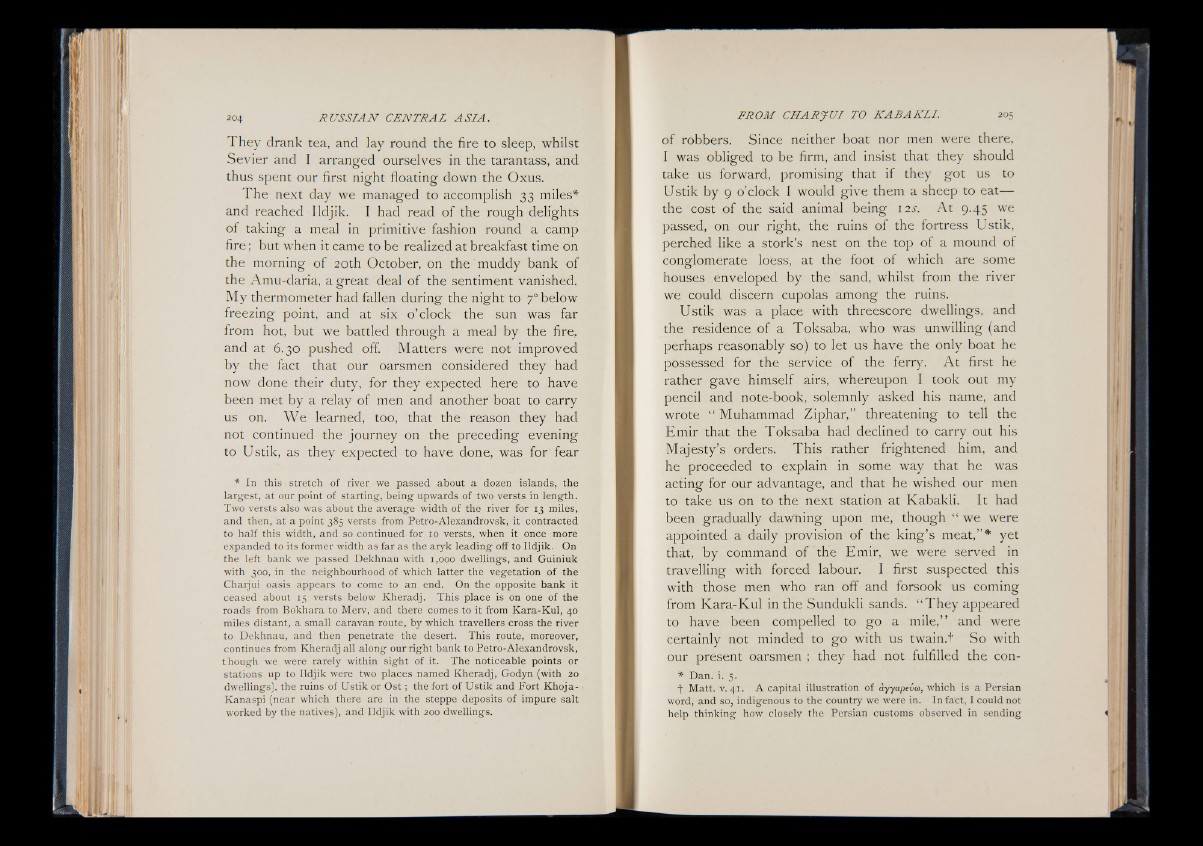
T hey drank tea, and lay round the fire to sleep, whilst
Sevier and I arranged ourselves in the tarantass, and
thus spent our first night floating down the Oxus.
The next day we managed to accomplish 33 miles*
and reached Ildjik. I had read of the rough delights
of taking a meal in primitive fashion round a camp
fire; but when it came to be realized at breakfast time on
the morning of 20th October, on the muddy bank of
the Amu-daria, a great deal of the sentiment vanished.
My thermometer had fallen during the night to 70 below
freezing point, and at six o’clock the sun was far
from hot, but we battled through a meal by the fire,
and at 6.30 pushed off. Matters were not improved
by the fact that our oarsmen considered they had
now done their duty, for they expected here to have
been met by a relay of men and another boat to carry
us on. W e learned, too, that the reason they had
not continued the journey on the preceding evening
to Ustik, as they expected to have done, was for fear
* In this stretch of river we passed about a dozen islands, the
largest, at our point of starting, being upwards of two versts in length.
Two versts also was about the average width of the river for 13 miles,
and then, at a point 385 versts from Petro-Alexandrovsk, it contracted
to half this width, and so continued for 10 versts, when it once more
expanded to its former width as far as the aryk leading off to Ildjik. On
the left bank we passed Dekhnau with 1,000 dwellings, and Guiniuk
with 300, in the neighbourhood of which latter the vegetation of the
Charjui oasis appears to come to an end. On the opposite bank it
ceased about 15 versts below Kheradj. This place is on one of the
roads from Bokhara to Merv, and there comes to it from Kara-Kul, 40
miles distant, a small caravan route, by which travellers cross the river
to Dekhnau, and then penetrate the desert. This route, moreover,
continues from Kheradj all along our right bank to Petro-Alexandrovsk,
though we were rarely within sight of it. The noticeable points or
stations up to Ildjik were two places named Kheradj, Godyn (with 20
dwellings), the ruins of Ustik or Ost; the fort of Ustik and Fort Khoja-
Kanaspi (near which there are in the steppe deposits of impure salt
worked by the natives), and Ildjik with 200 dwellings.
of robbers. Since neither boat nor men were there,
I was obliged to be firm, and insist that they should
take us forward, promising that if they got us to
Ustik by 9 o’clock 1 would give them a sheep to eat—
the cost of the said animal being 12s. A t 9.45 we
passed, on our right, the ruins of the fortress Ustik,
perched like a stork’s nest on the top of a mound of
conglomerate loess, at the foot of which are some
houses enveloped by the sand, whilst from the river
we could discern cupolas among the ruins.
Ustik was a place with threescore dwellings, and
the residence of a Toksaba, who was unwilling (and
perhaps reasonably so) to let us have the only boat he
possessed for the service of the ferry. A t first he
rather gave himself airs, whereupon I took out my
pencil and note-book, solemnly asked his name, and
wrote “ Muhammad Ziphar,” threatening to tell the
Emir that the Toksaba had declined to carry out his
Majesty’s orders. This rather frightened him, and
he proceeded to explain in some way that he was
acting for our advantage, and that he wished our men
to take us on to the next station at Kabakli. It had
been gradually dawtnng upon me, though “ we were
appointed a daily provision of the king’s meat,” * yet
that, by command of the Emir, we were served in
travelling with forced labour. I first suspected this
with those men who ran off and forsook us coming
from Kara-Kul in the Sundukli sands. “ They appeared
to have been compelled to go a mile,” and were
certainly not minded to go with us twain.t So with
our present oarsmen ; they had not fulfilled the con-
* Dan. i. 5.
t Matt. v. 41. A capital illustration of ayyapeva, which is a Persian
word, and so, indigenous to the country we were in. In fact, I could not
help thinking how closely the Persian customs observed in sending